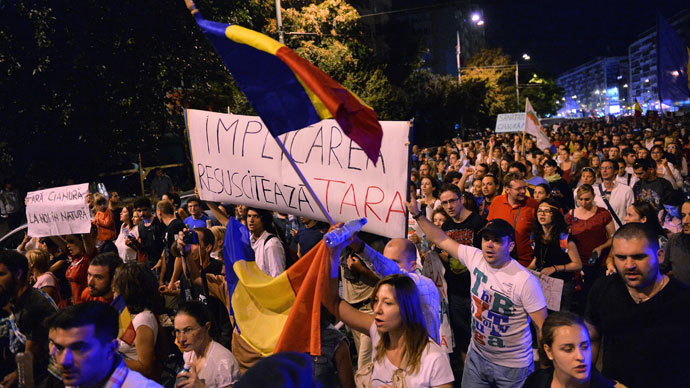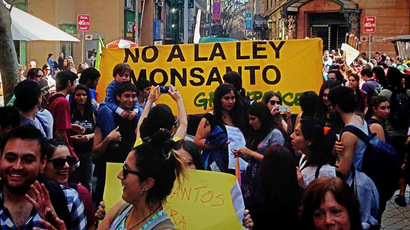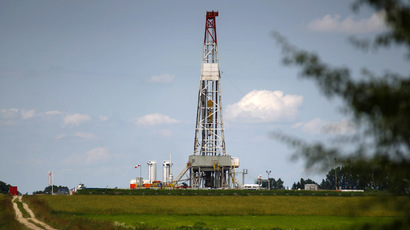Cyanide pollution fears: Thousands of Romanians protest ‘biggest in Europe’ gold mine

Massive protests are gripping Romania against the government’s controversial decision to pave the way for a Canadian firm to build Europe’s largest opencast gold mine – which many fear may lead to an environmental disaster.
Some 15,000 people, including students and young parents, rallied
across the country on Sunday in the eighth day of protests
against a draft law issued by the leftist government, which would
allow a Canadian miner to dig for gold and silver in the small
town of Rosia Montana in Transylvania, northern Romania.
Eight thousand protesters marched to the government headquarters
in Bucharest, carrying signs reading “I love nature, not
cyanide” and “Corruption equals cyanide.” According to
police, 6,000 demonstrators also rallied in the major
Transylvanian city of Cluj and 900 people gathered in Brasov.
Gabriel Resources Ltd plans to expand and modernize old Roman
gold mines to extract over 300 tons of yellow metal and 1,500
tons of silver. The quarries would destroy four mountain peaks
and three villages out 16 in the municipality. But the biggest
scare for rights activists and environmentalists is the planned
use of around 12,000 tons of toxic cyanide needed for the mining
process each year.

The gold mine project has been stalled for around 14 years, with environmental issues being the key concern. Romanian parliament has yet to give the project the go-ahead. Lawmakers are expected to have their say later in September.
"We are calling on the government to withdraw this draft law
without delay," a protester told AFP amid chants calling for
the government to resign.
The draft bill is to grant the project the status of "special
national interest." According to observers, that will give
Rosia Montana Gold Corporation – Gabriel Resources’ local arm –
more freedom to expropriate land they need for the mine.
Ecology and safety vs. jobs
Opponents slammed the move as a violation of the country’s fundamental laws.
“This law breaks constitutional laws. It breaks property laws
for the people in Rosia Montana, heritage laws and clean
environment laws,” artist Mihnea Blidariu told Euronews.
Romania’s stake in the project would be 25 percent.
Gabriel Resources said earlier that if the legislation is adopted
by parliament, it “will set the framework to significantly
accelerate the development of Europe’s largest gold mine at Rosia
Montana and other mining projects in Romania.”
The company's CEO, Jonathan Henry, said the government's move
“represents a significant milestone for all stakeholders.”

“We are extremely encouraged by this major step towards
progression of the permitting process and consider it to be a
clear sign of endorsement by the government for investment into
Romania,” Henry added, according to a press release posted on
the company’s website.
Supporters of the mine’s construction say that it would bring billions in taxes to the budget and help sort the problem of unemployment in the region. According to Gabriel, the project will create around “2,300 jobs in the construction phase and 900 in the operational phase.”
The majority of Rosia Montana’s 2,800 residents support the mine
project, hoping that it will bring money to the town which was
economically hit by the closure of the state-owned gold mine in
2006, Reuters reported. Only a small number of people refuse to
sell their property to give way to the construction of the mine.
However, many Romanians fiercely oppose the project, still remembering the 2000 cyanide spill near the town of Baia Mare. It happened when a dam containing toxic waste material from a gold mine burst, releasing 100,000 cubic meters of cyanide-contaminated waste water into the Lapus, the Somes, and eventually the Tisza and Danube rivers. The human-made disaster was labeled among the worst in Europe after the Chernobyl catastrophe.

Hungary, whose wildlife along the Tisza was nearly wiped out by
the spill in 2000, has asked authorities in neighboring Romania
to observe the European rules for gold mining. They also asked
Bucharest to protect Europe’s cultural and environmental heritage
which is “in danger” because of the gold mining project,
Romania-Insider.com reported.
Gold mine to be put to referendum?
Rallies and criticism prompted Romanian President Traian Basescu
to propose a national referendum on allowing the development of
the Rosia Montana mine.
“If debates are going to continue and we do not find a viable
solution for carrying out with this project I will take into
account the possibility of organizing a referendum; unless, of
course, the government finds the resources to discuss the issue
with the civil society. I will organize it at the same time with
the euro parliamentary elections,” he said earlier in the
week, as quoted by Romanian news agency Agerpres.
He clarified on Tuesday evening that he did not initiate a
process for holding a national vote on the matter, but mentioned
it only as a possibility. Basescu noted that the option would be
put forward in case citizens remain split on the Rosia Montana
mine after parliamentary debates take place.
Meanwhile, Gabriel expects to get parliamentary approval for the
project as soon as November, CEO Jonathan Henry told Bloomberg on
Monday.
“We are hopeful that it will be smooth process to approval and
it will be a fast process to approval. We’ve been waiting a long
time and need to get on with things,” he said.
The Rosia Montana Gold Corporation, RMGC, maintains that cyanide
“is not a dangerous substance if used according to strict
protection requirements,” the company’s website states. The
firm says it will ensure “full safety of use of this substance
due to the technological process and cyanide management
plan.”
Cyanide is widely used by the mining industry to assist in the
extraction of gold from ore. However, there are two main risks
associated with the process: the possibility of cyanide leaching
into soil and groundwater at toxic concentrations, and
catastrophic spills which may lead to flooding an ecosystem with
toxic levels of cyanide.

















